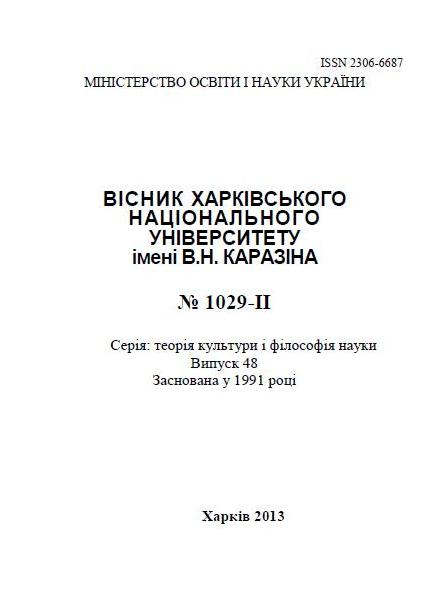СВ. ФРАНЦИСК АССИЗСКИЙ С ТОЧКИ ЗРЕНИЯ ФИЛОСОФСКОЙ АНТРОПОЛОГИИ: МОДЕРНИЗМ И ПОСТМОДЕРНИЗМ
Abstract
Интерес к св. Франциску Ассизскому проявился как в эпоху модернизма, так и в
более широкой культурной ситуации постмодерна. Св. Франциск занял важное место в
теоретических работах из области философской антропологии и в практическом
осмыслении философско-антропологических феноменов, таких как радость, смех,
свобода, удивление. Христоцентричная антропология св. Франциска была
противопоставлена антропологии доминирования.
Голозубов О.В. СВ. ФРАНЦИСК АССІЗЬКИЙ З ТОЧКИ ЗОРУ ФІЛОСОФСЬКОЇ
АНТРОПОЛОГІЇ: МОДЕРНІЗМ І ПОСТМОДЕРНІЗМ Інтерес до св. Франциска
Ассизького проявляється як в епоху модернізму, так і в більш широкій культурній
ситуації постмодерну. Св. Франциск зайняв важливе місце в теоретичних роботах з
області філософської антропології і в практичному осмисленні філософсько-
антропологічних феноменів, як радість, сміх, свобода, здивування. Христоцентрична
антропологія св. Франциска була протиставлена антропології домінування.
Ключові слова: св. Франциск Ассізький, францисканство, модернізм, постмодернізм,
філософська антропологія, радість, свобода.
Golozubov AV ST. FRANCIS OF ASSISI FROM THE POINT OF VIEW OF
PHILOSOPHICAL ANTHROPOLOGY: MODERNISM AND POSTMODERNISM In the article
St. Francis has been considered from the standpoint of the history and content of philosophical
anthropology. In his life and preaching such fundamental to the philosophy of the human being
as joy and laughter, wonder and freedom can be found. Image of St. Francis has been actualized
both in the modern epoch and in the wider cultural postmodern situation. His personality and
phenomenon of the Franciscanism in the whole play an important role in finding ways of
interacting between anthropology and theology in its updated postmodern version. Both waves of
interest to the saint from Assisi in the twentieth century coincided with the growing problem of a
man and at the same time appeal to the medieval discourse. Refuse of the concept of the Dark
Ages in the situation of modernism / postmodernism led to the rehabilitation of the medieval
intellectual culture and therefore carnival comic elements. In this sense interpretation of St.
Francis in the novels of N. Kazantzakis, U. Eco etc. looks relevant. St. Francis took an important
place in the philosophical and anthropological discourse, starting with Max Scheler, in
theoretical writings in the field of the philosophical anthropology, and practical reflections on
philosophical and anthropological phenomena. St. Francis’ Christocentric anthropology was
understood as opposed to the anthropology of domination. Interest of philosophy to this last is
quite natural if we consider philosophy as the ability to surprise, as the source of joy, humility
before the diversity of the world and childishness close to buffoonery.
Keywords: St. Francis of Assisi, Franciscanism, modernism, postmodernism, philosophical
anthropology, joy, freedom.




